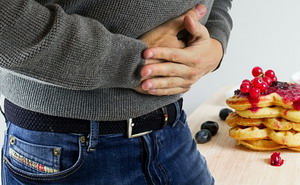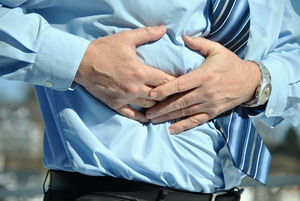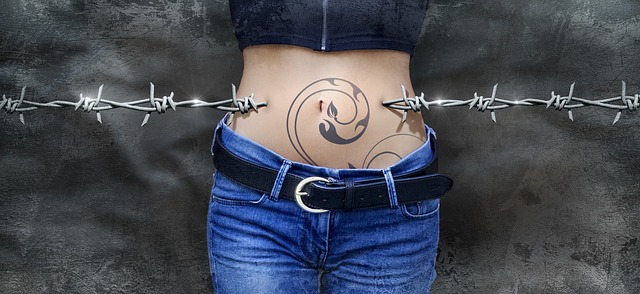 Probably the most common issue I find patients complaining about besides their back pain is gut problems. This is not surprising as finding healthy foods to eat on a regular basis is getting pretty darn difficult. Even knowing what foods are healthy is becoming a mystical science. Unfortunately, the usual sources we used to refer to for good information on nutrition have become corrupted by the “science for hire” movement of the last 60 – 70 years. It takes a lot more work than anyone other than the most obsessive to sift through the research literature to try and piece together some sense of what is real and useful. Fortunately, there are a few such obsessives out there that do draw out some usable data for us to work with.
Probably the most common issue I find patients complaining about besides their back pain is gut problems. This is not surprising as finding healthy foods to eat on a regular basis is getting pretty darn difficult. Even knowing what foods are healthy is becoming a mystical science. Unfortunately, the usual sources we used to refer to for good information on nutrition have become corrupted by the “science for hire” movement of the last 60 – 70 years. It takes a lot more work than anyone other than the most obsessive to sift through the research literature to try and piece together some sense of what is real and useful. Fortunately, there are a few such obsessives out there that do draw out some usable data for us to work with.
 We think of ourselves as fairly protected from the world by our amazing skin. Skin is a complex organ that is both protective and flexible. It is tough like soft leather because it has so many layers to it that mostly keep the outside stuff out and the inside stuff in. On average it will be 30 plus cells thick. What we don’t think of is that our gut has to do the same thing in a much more difficult situation. Technically it too is skin, but it is only one cell thick. It has to not only keep all the thousands of kinds of bacteria, viruses, and fungi inside the gut tube, but it also has to let food across the gut wall and into the bloodstream. All this has to happen while strong stomach acids are doing their work, powerful enzymes are doing their work, and everything has to squish and move to get all this mess traveling down and out. That is crazy. One cell thick is so thin you can see right through it. And believe it or not, it has a surface area the size of a tennis court if it were all stretched out flat. That is a lot of one-cell thick surfaces to try to keep intact and healthy.
We think of ourselves as fairly protected from the world by our amazing skin. Skin is a complex organ that is both protective and flexible. It is tough like soft leather because it has so many layers to it that mostly keep the outside stuff out and the inside stuff in. On average it will be 30 plus cells thick. What we don’t think of is that our gut has to do the same thing in a much more difficult situation. Technically it too is skin, but it is only one cell thick. It has to not only keep all the thousands of kinds of bacteria, viruses, and fungi inside the gut tube, but it also has to let food across the gut wall and into the bloodstream. All this has to happen while strong stomach acids are doing their work, powerful enzymes are doing their work, and everything has to squish and move to get all this mess traveling down and out. That is crazy. One cell thick is so thin you can see right through it. And believe it or not, it has a surface area the size of a tennis court if it were all stretched out flat. That is a lot of one-cell thick surfaces to try to keep intact and healthy.
 The reality is, it is too much to keep healthy. Because of this, our body has to replace our gut lining cells every 5 to 7 days. They just get too damaged doing their job. Our body replaces billions of cells every day. Our gut requires the greatest number of those replacement cells on a daily basis. This becomes a big problem for our immune system as these damaged cells start allowing undigested food, fungi, bacterial parts, viruses, microplastics, and who knows what all else from the stuff we call food to get into our bloodstream and the rest of the body. This stuff is not supposed to be in the body. If you got sick and vomited, would you scoop the vomit up, put it into a syringe, and inject it into your veins? That is essentially what is getting into your blood through the gut lining. The point is creating and maintaining a healthy gut is vital to your health.
The reality is, it is too much to keep healthy. Because of this, our body has to replace our gut lining cells every 5 to 7 days. They just get too damaged doing their job. Our body replaces billions of cells every day. Our gut requires the greatest number of those replacement cells on a daily basis. This becomes a big problem for our immune system as these damaged cells start allowing undigested food, fungi, bacterial parts, viruses, microplastics, and who knows what all else from the stuff we call food to get into our bloodstream and the rest of the body. This stuff is not supposed to be in the body. If you got sick and vomited, would you scoop the vomit up, put it into a syringe, and inject it into your veins? That is essentially what is getting into your blood through the gut lining. The point is creating and maintaining a healthy gut is vital to your health.
What are the common symptoms of poor gut health?
 1. Diarrhea
1. Diarrhea
2. Constipation
3. Heartburn
4. Low Back Pain – belt line
5. Mid Back Pain – central
6. Bloating
7. Gas – bad smelling
8. Stomach cramps
9. Fatigue after eating
10. Bad Breath
11. Skin problems – acne/dry
12. Bad moods after eating
13. Tenderness over bowel
 As you can see, your body tries to tell you when things are not happy in the gut. None of these things are normal and should not be ignored. Yet we do ignore them. There are buckets full of over-the-counter remedies for these problems, most of which do not work. So, we put up with these signals from our unhappy gut because these symptoms do not threaten to kill us this week. They will kill us eventually, but the consequences take many years to manifest. Crappy food falls in the same league as smoking and drinking. It may take 40 years before the consequences catch up with you, and the consequences usually have nothing to do with the gut itself. It may show up as an autoimmune disease like Hashimoto’s thyroiditis or heart disease or dementia or cancer. The father of medicine, Hippocrates, stated nearly 2500 years ago that “All disease starts in the gut.” There is a lot of truth to this statement.
As you can see, your body tries to tell you when things are not happy in the gut. None of these things are normal and should not be ignored. Yet we do ignore them. There are buckets full of over-the-counter remedies for these problems, most of which do not work. So, we put up with these signals from our unhappy gut because these symptoms do not threaten to kill us this week. They will kill us eventually, but the consequences take many years to manifest. Crappy food falls in the same league as smoking and drinking. It may take 40 years before the consequences catch up with you, and the consequences usually have nothing to do with the gut itself. It may show up as an autoimmune disease like Hashimoto’s thyroiditis or heart disease or dementia or cancer. The father of medicine, Hippocrates, stated nearly 2500 years ago that “All disease starts in the gut.” There is a lot of truth to this statement.
 Okay, so we get it that the gut is very vulnerable while also being on the front line of interfacing with the outside world. To communicate this to patients, I explain that the gut lining is as sensitive as the inside of your eyelid. You know how that feels when even a tiny speck gets in your eye. How do you think it would feel if you rubbed granola in your eye? How about popcorn, pretzels, or tortilla chips? Let’s try some nice raw organic broccoli in your eye. Oh, you are keto – how about rubbing any sort of nuts or seeds in your eye? Well, your gut does not like any of these things. They are too rough. Your gut lining is as thick as the lightest tissue paper. This is why we were designed with a mouth full of teeth at the upper end of the digestive tract. All food needs to be chewed to the point of being liquefied before swallowing it. Eating while on the run is a guaranteed way to develop gut health problems. Not only do you not chew your food enough, but the nervous system is not switched over to the relax and digest mode while you are on the run. Relaxation is critical. Stress alone is enough all by itself to destroy your gut integrity.
Okay, so we get it that the gut is very vulnerable while also being on the front line of interfacing with the outside world. To communicate this to patients, I explain that the gut lining is as sensitive as the inside of your eyelid. You know how that feels when even a tiny speck gets in your eye. How do you think it would feel if you rubbed granola in your eye? How about popcorn, pretzels, or tortilla chips? Let’s try some nice raw organic broccoli in your eye. Oh, you are keto – how about rubbing any sort of nuts or seeds in your eye? Well, your gut does not like any of these things. They are too rough. Your gut lining is as thick as the lightest tissue paper. This is why we were designed with a mouth full of teeth at the upper end of the digestive tract. All food needs to be chewed to the point of being liquefied before swallowing it. Eating while on the run is a guaranteed way to develop gut health problems. Not only do you not chew your food enough, but the nervous system is not switched over to the relax and digest mode while you are on the run. Relaxation is critical. Stress alone is enough all by itself to destroy your gut integrity.
 Let’s talk enzymes and acid. As you chew your food, the first wave of digestive enzymes starts breaking the food down to the molecular level needed for absorption. In your stomach, the second wave hits with an acid bath to open up the proteins so the pepsin enzyme can start cutting them into tiny pieces. The third wave hits right below the stomach in the duodenum. Here the pancreas dumps in a load of lots of other enzymes to break down various sugars, fats, and proteins. The liver/gallbladder also dumps bile into the food at this point to act like a detergent to break down fats. Each of these steps is further action to the food just like chewing but on a tiny molecular scale. In an ideal world, your food should be completely broken down into a nutritious slime which then travels down your small intestine to be absorbed. The only thing that should not be broken down is the various fibers that feed the good guy bacteria in your gut.
Let’s talk enzymes and acid. As you chew your food, the first wave of digestive enzymes starts breaking the food down to the molecular level needed for absorption. In your stomach, the second wave hits with an acid bath to open up the proteins so the pepsin enzyme can start cutting them into tiny pieces. The third wave hits right below the stomach in the duodenum. Here the pancreas dumps in a load of lots of other enzymes to break down various sugars, fats, and proteins. The liver/gallbladder also dumps bile into the food at this point to act like a detergent to break down fats. Each of these steps is further action to the food just like chewing but on a tiny molecular scale. In an ideal world, your food should be completely broken down into a nutritious slime which then travels down your small intestine to be absorbed. The only thing that should not be broken down is the various fibers that feed the good guy bacteria in your gut.
 Well, we don’t live in an ideal world. Our food is now full of non-food items our digestive tract has no idea what to do with. Last week I learned that we consume as much plastic each week as it takes to make a credit card. Our food is full of weird chemicals designed to change the product’s texture, taste, color, smell, and stability. Preservatives and mold inhibitors and pesticides fill our food products. The raw food sources themselves are filled with herbicides (like glyphosate) and pesticides, and pollutants from the water and air of all sorts. Even the ways we cook manage to destroy our gut. Deep frying or cooking with hot oils produces gut-damaging rancid oils and browning our meats and bakery products produces all sorts of nasty chemicals. Every one of these things damages the gut. This is why our gut health is so bad in this country. And from this terrible gut health flows our epidemic of chronic disease.
Well, we don’t live in an ideal world. Our food is now full of non-food items our digestive tract has no idea what to do with. Last week I learned that we consume as much plastic each week as it takes to make a credit card. Our food is full of weird chemicals designed to change the product’s texture, taste, color, smell, and stability. Preservatives and mold inhibitors and pesticides fill our food products. The raw food sources themselves are filled with herbicides (like glyphosate) and pesticides, and pollutants from the water and air of all sorts. Even the ways we cook manage to destroy our gut. Deep frying or cooking with hot oils produces gut-damaging rancid oils and browning our meats and bakery products produces all sorts of nasty chemicals. Every one of these things damages the gut. This is why our gut health is so bad in this country. And from this terrible gut health flows our epidemic of chronic disease.
 There is no easy answer to this huge problem. It is so big that it has become the elephant in the room that everyone is ignoring. Eating organic is a help. Buying from local farmers who practice more natural farming techniques is a help. Cooking in ways that encourage better digestion helps. For example, steaming your veggies is good as is using sous vide or crock pot cooking so your meats retain the most nutrition without overcooking or adding toxic oils. Generally, using the lowest temperature you can while cooking maximizes the health of your gut.
There is no easy answer to this huge problem. It is so big that it has become the elephant in the room that everyone is ignoring. Eating organic is a help. Buying from local farmers who practice more natural farming techniques is a help. Cooking in ways that encourage better digestion helps. For example, steaming your veggies is good as is using sous vide or crock pot cooking so your meats retain the most nutrition without overcooking or adding toxic oils. Generally, using the lowest temperature you can while cooking maximizes the health of your gut.
 Another thing you can do to support the health of your gut is to avoid drinking with your meals as this dilutes the stomach acid so it can not do its job. Eat some bitter greens now and then to stimulate bile flow from the liver to help clean out those pipes. I have already mentioned the importance of chewing your food very well. Eat foods rich in the fibers that support the good guy bacteria as well as actually eating foods that contain good guy bacteria, like raw fermented cabbage, real yogurt or kefir, aged real cheese (not pasteurized), fermented pickles, raw apple cider vinegar, wine, unpasteurized beer, kombucha tea, miso, tempeh, kvass – here is a big list. List of fermented foods – Wikipedia
Another thing you can do to support the health of your gut is to avoid drinking with your meals as this dilutes the stomach acid so it can not do its job. Eat some bitter greens now and then to stimulate bile flow from the liver to help clean out those pipes. I have already mentioned the importance of chewing your food very well. Eat foods rich in the fibers that support the good guy bacteria as well as actually eating foods that contain good guy bacteria, like raw fermented cabbage, real yogurt or kefir, aged real cheese (not pasteurized), fermented pickles, raw apple cider vinegar, wine, unpasteurized beer, kombucha tea, miso, tempeh, kvass – here is a big list. List of fermented foods – Wikipedia
Be aware that if you cook or heat up any of these, you will kill the beneficial bacteria.
 To sum up, only put good healthy food in your mouth to start with. Eat when you are relaxed and have the time to chew well. Don’t drink anything with your meal — before is okay. Gently cook your food. Don’t overeat as this overwhelms the digestive process. Stimulate bile flow from your liver with bitter greens now and then. Consume probiotic good guy bacteria by eating fermented foods regularly. Also, consume lots of soluble fiber-containing foods – not so much the scratchy insoluble fibers like wheat bran. Enjoy your meals. This maximizes the digestion and absorption of the food.
To sum up, only put good healthy food in your mouth to start with. Eat when you are relaxed and have the time to chew well. Don’t drink anything with your meal — before is okay. Gently cook your food. Don’t overeat as this overwhelms the digestive process. Stimulate bile flow from your liver with bitter greens now and then. Consume probiotic good guy bacteria by eating fermented foods regularly. Also, consume lots of soluble fiber-containing foods – not so much the scratchy insoluble fibers like wheat bran. Enjoy your meals. This maximizes the digestion and absorption of the food.
Take care,
David
